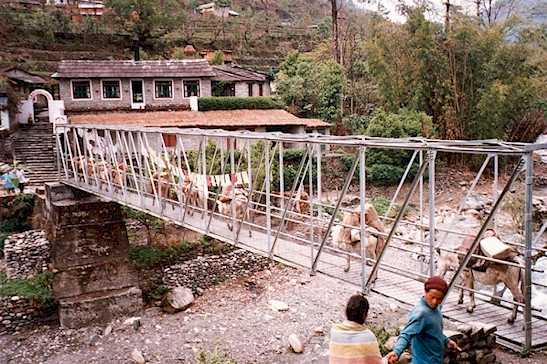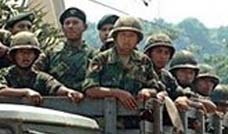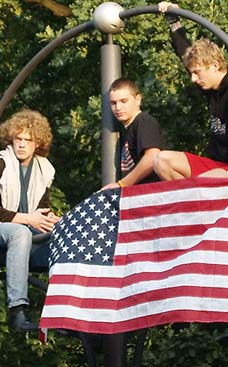
"I spoke with Peace Corps while I was recently in Washington. We will continue to jointly review the evolving security climate in Nepal. I think we have to admit that security conditions outside of Kathmandu vary considerably from district to district. When villages of Nepal benefit from improved security, and the government of Nepal indicates it would welcome a return, I am confident that Peace Corps will be ready to see how the program might be re-instituted in Nepal."
US Ambassador to Nepal Nancy J. Powel says: Peace Corps continues to jointly review the evolving security climate in Nepal
US eager to sustain partnership for peace with Nepal
By Ambar Mainali
Kathmandu, Sept. 8
US Ambassador to Nepal Nancy J. Powell has said that the US would give continuity to the process of resettling Bhutanese refugees in the US as per the agreement reached with the Nepal Government. In a written interview to The Rising Nepal, Powell said that the initially agreed number of 60,000 was not a limit set by the US Government. Powell who took office on August 9, 2007 after submitting her credentials to erstwhile Prime Minister Girija Prasad Koirala expressed her governmentís keen interest to assist Nepalís peace process in the days ahead. She previously served in Kathmandu as a consular officer from 1980 to 1982 and as the State Department Nepal Desk Officer from 1982 to 1984. Born in Cedar Falls, Iowa, Ambassador Powell joined the Foreign Service in 1977 following six-and-a-half years as a high school social studies teacher in Dayton, Iowa. She is a 1970 graduate of the University of Northern Iowa. She has studied French, Nepali, Hindi and Urdu. Excerpts:
America has been a true partner in Nepalís march towards achieving lasting peace, how is the US government looking forward to assist Nepalís peace process in the days ahead?
The U.S. has been one of the most consistent supporters of peace and development in Nepal since our first agreement in 1951; a true partner, as you put it so well, with the Nepalese people. We recently gave the Prime Minister a summary of U.S. assistance for peace and development in Nepal, and I will be offering a similar presentation to members of the Constituent Assembly at my residence over the coming year.
We have invested over $1 billion ($1,000,000,000) in Nepal since we established our first technical cooperation agreement with Nepal in 1951. In partnership with the Government of Nepal, US assistance plays a crucial role in supporting the transition to peace, building a representative government, establishing rule of law, ending human rights abuses, improving health care and addressing poverty.
As part of our most recent support for the peace process, we provided training in peace-building and reconciliation skills to 25 government officials; we supported the production of numerous Public Service Announcements for radio and TV about the CPA; employed youth to repair roads and schools in Terai communities and provided over 6000 Nepali child victims of conflict with educational opportunities.
We are eager to sustain this partnership for peace with the new Government of Nepal and hope it may begin soon the urgent task of providing the people with the security and economic opportunity Nepalis so richly deserve.
You have just returned from your trip to the US, did you meet your seniors at the State Department, any good news for Nepal?
I did recently return from a working visit to the U.S. The good news for Nepal is that Nepal has many friends in the U.S. who are interested in this country and committed to assist Nepalis in making democracy a success. There are both Democrats and Republicans in our national legislature interested in the latest developments here and eager to hear of progress in providing services and security to the people of Nepal.
The US government has been assisting Nepalís development endeavours through the USAID and has been giving a large amount of foreign aid, what has been the impact of the aid, could you point out the areas of improvements needed for better results?
USAID and related US government assistance to Nepal has indeed helped in Nepalís development endeavors. The United States spent more than $83 million ($83,000,000) in Nepal just last year. The U.S. has also supported strengthening Nepalís democracy and governance through programs like the Media and Results Center for the Election Commission, purchased printing machines and paid for the printing of 41 million ballots through which the Nepali people elected the new Constituent Assembly; established 3 new mediation centers to help justices manage court cases in Nepal and funded a pilot series of live radio broadcasts featuring CA members discussing "The CA and the Future of Nepal."
USAID has provided assistance to the health sector in Nepal for more than 50 years, with significant contributions to malaria control, family planning and maternal health, infrastructure development, logistics management and equipment for health facilities, as well as clinical education and training. Nepalís hugely successful child health programs including vitamin A supplementation and pneumonia treatment through community health workers and volunteers have received significant support by USAID. As a result of these programs and others like immunisations, Nepal has seen an almost 50% decline in under-five mortality since the time I was here in the mid 1980ís. This is a remarkable achievement given the political and economic difficulties Nepal has faced in the same time frame. Nepal has made significant progress toward achieving the Millennium Development Goals with reductions in maternal and child mortality, increases in contraceptive prevalence, and stabilisation of the HIV epidemic in key vulnerable groups.
My hope is that USAID will continue in this role and that the new government will encourage the reforms in the health sector that are necessary for continued progress. These include better human resource planning and management to ensure health workers have the skills and supplies they need to provide services, are deployed to the places they are needed most, and that they are in-place and accountable to the communities they serve. The health sector needs more financial resources, and at the same time greater transparency and accountability that the resources are directed to address the major public health needs of the citizens.
Following the departure of 1,255 Bhutanese refugees living in different camps in eastern Nepal to the US for third country resettlement by June 25, 2008; many more have been showing interest for the same despite threats from pro-repatriation groups. Against this backdrop, does the US plan to increase the initially committed number of 60,000 refugees, which it agreed to resettle?
As the country that admits more refugees than all other countries in the world combined, the U.S. is committed to providing the option of third country resettlement to the population of Bhutanese refugees who have been living in "temporary" camps for 17 years. Last year, the U.S. committed to having a major role in resolving this refugee situation. The 60,000 figure was not a limit. The United States will consider for resettlement any refugee that expresses interest.
I am pleased that nearly 4,000 refugees who sought resettlement in a third country have been successfully relocated so far, and that tens of thousands of refugees have come forward for resettlement consideration. We expect the resettlement effort to continue for several more years.
Political parties in Nepal, often the left parties accuse the US of meddling in Nepalís internal politics, how far do you agree or disagree with the charges?
U.S. engagement in Nepalís development and democratisation has been sustained over more than 50 years and a dozen U.S. Ambassadors.
We support the people of Nepal and their democratic process. We donít "meddle" in Nepalís internal politics. The people of Nepal know this. It would be a great help if the media did not publish every wild accusation of meddling.
The American Peace Corps Volunteers had been assisting Nepalís development initiatives in the villages for many decades, they decided to leave in the midst of growing insecurity, now that peace has been restored to a great extent, are there any plans of resuming Peace Corps activities in Nepal?
Peace Corpsí contributions to Nepal have been enormous, and Nepal has made lifelong friends of hundreds of Peace Corps volunteers over the years. All of us were disappointed when declining security conditions, particularly in hills and villages, forced Peace Corps to terminate the program in Nepal.
I spoke with Peace Corps while I was recently in Washington. We will continue to jointly review the evolving security climate in Nepal. I think we have to admit that security conditions outside of Kathmandu vary considerably from district to district. When villages of Nepal benefit from improved security, and the government of Nepal indicates it would welcome a return, I am confident that Peace Corps will be ready to see how the program might be re-instituted in Nepal.












